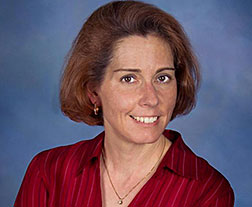- Number 424 |
- October 13, 2014
Kiplinger's work supports threat reduction, clean energy and safer, inexpensive materials

Los Alamos National Laboratory scientist
Jaqueline L. Kiplinger
Los Alamos National Laboratory scientist Jaqueline L. Kiplinger has been selected as the 2015 recipient of the F. Albert Cotton Award in Synthetic Inorganic Chemistry, honored for her work in establishing synthetic routes to novel uranium and thorium compounds that have opened new frontiers in understanding the nature of bonding and reactivity in actinides.
In addition to discovering new actinide reactivity patterns and bonding motifs, Kiplinger has developed inexpensive, simple and safe techniques to make thorium and uranium halide starting materials, which has been critical to advancing the synthetic and mechanistic chemistry of these important elements and for understanding their behavior in a variety of applications.
“To be nominated and selected for the Cotton Award by my American Chemical Society colleagues is such an extraordinary honor,” Kiplinger said. “I have found so much joy in actinide chemistry research, both in advancing fundamental knowledge for the nation, and in training future generations of scientists.”
Kiplinger’s novel synthetic approaches have led to the systematic isolation of entirely new classes of molecular uranium and thorium complexes. In other work, she pioneered the use of copper and gold reagents as one-electron oxidants for actinide compounds and designed a photochemical synthesis that established the first-ever evidence for the formation of a uranium complex that contains a terminal uranium-nitrogen triple bond.
“Collaborations have been critical to my success, and I have been privileged to work with many talented and motivated staff, post doctorates and students who have helped me advance this experimentally challenging area of chemistry; none of these discoveries would have been made without them,” said Kiplinger.
She is internationally recognized as a scientific leader in actinide and lanthanide chemistry and is a Fellow of the American Association for the Advancement of Science and the Royal Society of Chemistry. She has published nearly 80 journal articles and has received more than 2100 citations.
This is the second national-level American Chemical Society award she has received; the first being the Nobel Laureate Signature Award for Graduate Education in Chemistry in 1998.
Additionally, Kiplinger has served the American Chemical Society with distinction. She served as an alternate councilor for the ACS’s Division of Inorganic Chemistry from 2009-2011, on the Editorial Board for the ACS journal Organometallics from 2010-2012, and most recently as the chair-elect and chairwoman for the Organometallic Chemistry Subdivision in the ACS’s Division of Inorganic Chemistry.
Kiplinger earned her doctorate in organometallic fluorocarbon chemistry from the University of Utah. She came to the Laboratory as the first Frederick Reines Distinguished Postdoctoral Fellow in 1999, and received the Laboratory’s inaugural Postdoctoral Distinguished Performance Award in 2001. She joined the Laboratory in 2002 as a technical staff member in the Chemistry Division.Submitted by DOE's Los Alamos National Laboratory
